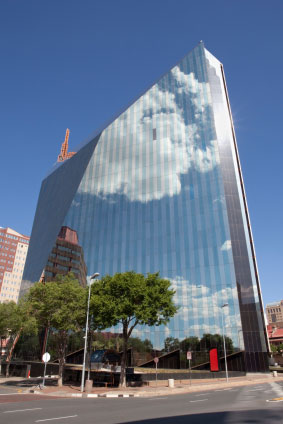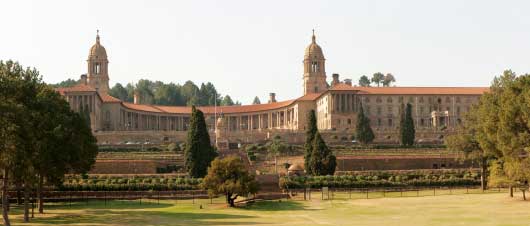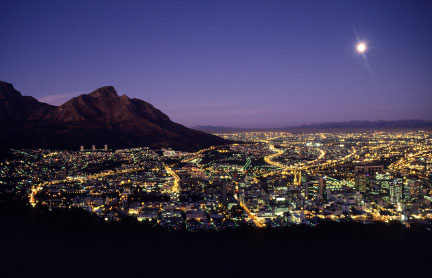South Africa is filled with fantastic natural scenery, a strong economy and a good standard of living, which are all big draws for potential expats. The two main cities for foreigners are Cape Town and Johannesburg. Both these cities are huge cosmopolitan melting pots. Despite a history of political unrest and racial tension new members of South Africa’s society can still lead an enjoyable and prosperous life without being affected by underlying issues.

South Africa shed its legacy of apartheid in 1994 and ushered in a new era of democracy. It was after this time that S.A was truly able to flourish as a nation and become an acceptable destination for expatriates.
The climate in South Africa has plenty of sunshine. The southern regions can get a little unsettled during the winter, whereas the eastern coast and inlands tend to have some rainy weather in the summer.
Employment, Work Permits and Visas
South Africa has a strong economy that has many opportunities for expats, especially in areas such as finance, IT and engineering. Work patterns typically follow the standard 9 to 5 regime, and it is unlikely that working in South Africa will throw up any odd cultural differences. However, it is worth noting that only skilled individuals would be advised to seek expat employment in South Africa as there is already a large unskilled workforce available. More detailed information on what types of foreign workers should apply for work permits in South Africa can be found at: http://www.southafrica.info/travel/documents/workpermits.htm
Business Culture
The South African attitude towards business is very similar to that of the USA and Europe. It will not be necessary to spend time forging personal relationships, business is business, although having an extensive number of business contacts is helpful and networking is encouraged. English is the common business language, but Afrikaans is also used, so when printing business cards use both languages. South Africans are very punctual and organised so always schedule meetings in advance and always be on time. Dress codes in the South African workplace can often be quite relaxed, however one should adopt the usual mentality of dressing smart for meetings, interviews etc. A simple handshake is acceptable for greeting purposes, and strong eye contact is seen as a mark of sincerity.
South Africans are also quite relaxed when it comes to business deals and will avoid confrontationinstead seeking to close on mutual agreement. It is important to maintain a calm demeanour when doingbusiness with South Africans, aggressive business tactics are frowned upon, avoid arguments and do not interrupt or belittle colleagues.
Accommodation
The two main areas for expats are Cape Town and Johannesburg, so it is highly likely that you will end up in one of the two if you become an expat in SA.
In Cape Town the popular living areas are Tamboerskloof, Oranjezicht and Higgovale which are all located near the main city areas. Nearer the sea are Sea Point, Green Point, Clifton, and Camps Bay, also places that have large amounts of expats. If suburbia is your kind of place then venture a little out of the city to areas like Rondebosch, Claremont and Newland. These areas also have the bonus of being close to schools, useful for expats with children. Note that most accommodation in Cape Town comes unfurnished. Rental prices will differ from place to place but the market is generally cheaper than that of the UK.
Johannesburg is much bigger than Cape Town and expats tend to live in gated communities in areas such as Hyde Park, Hurlingham, Bryanston and Rivonia. Other areas include Fourways, Randburg and Midrand, which are a bit further afield from the city centre. It will be important to choose somewhere that is close to your work as traffic can lead to long commutes.
Transport
Transport services in SA may not be up to the standard of other big countries, buses and trains are unreliable and under-financed, recently they have faced strong competition from mini-bus taxis, which themselves are also unreliable. Also, unlike traditional taxis, they follow a set route and will not drive you to your personal location. There are also private taxis of course, but they are harder to find than the mini-taxis. However, with the 2010 Football World Cup the South African government is making strong efforts to improve public transport so that it can cope with the vast influx of visitors.
If you wish to drive an automobile in South Africa then you will be happy to know that all driving licenses are accepted, as long as they have a photo ID and they are printed in English.
Healthcare
South Africa has both public and private healthcare. The resources for public healthcare sadly are not of as high a standard as you may be used to. For this reason it is advised that should you encounter any medical difficulties you should seek out private healthcare. The bonus of this is that the private healthcare is substantially better than the public option. Facilities are of a very high standard and response times for emergencies are very fast. It would be wise to take out a medical insurance plan. The Medi-Clinic group is a leading private hospital group that actually has hospitals all over Africa and can be found here: http://www.mediclinic.co.za/hospitals/Pages/default.aspx

Education
If you are travelling with children then you will no doubt want them to receive a high standard of education. In Cape Town there are a number of state schools that offer varying levels of quality however there are also private schools that offer superior standards of education albeit at a price.
Some of the schools with the better reputations include: The International School of Cape Town, which follows the English national curriculum, The American International School, and the Waldorf School group. There are often big waiting lists for the best schools so to ensure a place you should apply as early as possible. Fees differ from place to place and can be from R20,000 (£1775) a year all the way up to R100,000 (£8900) per year.
The same all applies for Johannesburg, public schools vary and private schools offer the best education. The good private schools in Johannesburg include: The American International School of Johannesburg, Charterhouse School and the Horizon International High School.
Entertainment and Lifestyle
South Africa is a very diverse nation, there are over ten official languages spoken here, English included. South Africans are generally friendly and inviting towards expats, even though there are still some negative aspects of SA culture, a hangover from the apartheid days if you will, as an expat you will most likely be situated in the central areas, areas that will be free from tension and very similar to the western world you came from.
There is no doubt that South Africa is a place of immense natural beauty. When you journey to South Africa for the first time you will have much to do in the way of sightseeing. One of the most famous attractions is the majestic Table Mountain, found in Cape Town. Table Mountain is a flat-topped mountain with incredible views, a cable-car system and various walkways.
There are also numerous beaches to relax on, each equipped with golden sands, deep blue waters and delicious outside restaurants. The main beaches in Cape Town are Camps Bay, First Beach, Second Beach, Third Beach and Fourth Beach.
Wildlife lovers will adore Kruger National Park, a sprawling wildlife conservation park that houses a wide array of animals ranging from enormous elephants to rare lions, serpents and rhinos.
Cape Town and Johannesburg both have a great selection of shopping malls and boutiques if you like to indulge in a spot of retail therapy. The shopping hotspots of Cape Town include:
Cavendish Square - Located near the suburbs in Claremont is an upmarket shopping mall with clothing boutiques, home interior stores, book shops and a cinema.
V and A Waterfront is found near Table Mountain and has virtually everything you could ask for from a mall. There are boutiques, cinemas, bookshops, restaurants, an aquarium, and also live shows.
Canal Walk is Cape Town’s biggest mall and is a haven for high street stores and brands.
There are also great markets where you can pick up some authentic home grown products such as the Tokai Organic Market- a great place to sample some deliciously fresh produce and baked goods. The Tokai Market even has a handy play area for little ones so that you can enjoy a relaxing Saturday morning wander without having to put up with tiny wails of boredom and disapproval.
Greenmarket Square trades every day and is the oldest market in Cape Town. Here you can find knick-knacks, clothing and trinkets.
In Johannesburg, Sandton City is one of the most popular malls, this trendy place has pretty much every type of store you could imagine, so just make sure you have enough cash on you! Northgate Mall and Fourways Mall are also popular shopping hangouts, again housing a veritable fleet of stores, products and brands.
For authentic souvenirs you won’t be able to find anywhere else visit the Bruma Flea Market where quaint trinkets and attractive ornaments will be on offer.
South Africans are great lovers of sport, with football, rugby and cricket being the favourites. There are many South African football teams so venture to the stadiums of local teams such as the Kaizer Chiefs, Santos or the Orlando Pirates, to see some silky skills. Of course there are a host of sports bars and pubs that screen all the big games and events from various different leagues from around the world.

Cricket is also huge with South Africa being one of the worldwide heavyweights, regularly defeating the likes of Australia and India. Should you wish to partake in these sports as well as watching them you will be happy to know that there are a number of sporting facilities where you can exercise and enjoy yourself.
An aspect of South Africa that one should be aware of is the level of crime that plagues its major cities. Even though almost all big cities around the world have fairly high levels of crime unfortunately South Africa is a cut above the rest. Many South Africans live in secure gated communities or employ private security firms to ensure their protection. The best advice is to always be vigilant, avoid travelling alone late at night, and importantly when driving make sure the car doors are always locked as car-jacking is a serious problem in SA.
Visit the official South African information site for more details on all aspects of South African life: http://www.southafrica.info/
The South African embassy in the UK can be found here: http://www.southafricahouse.com/

